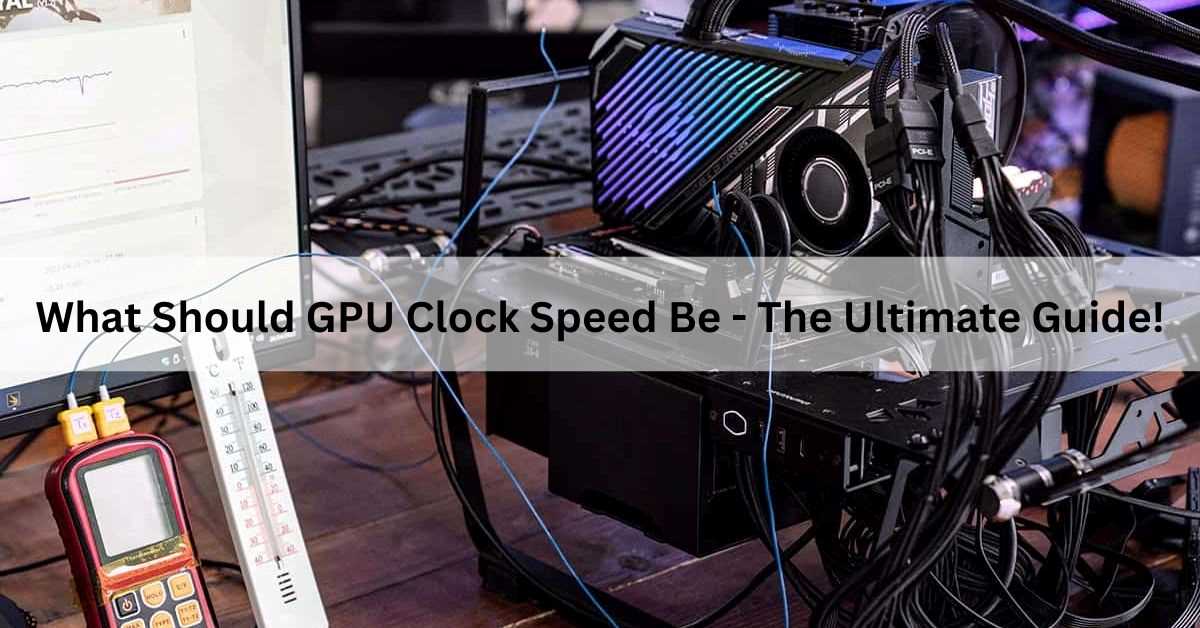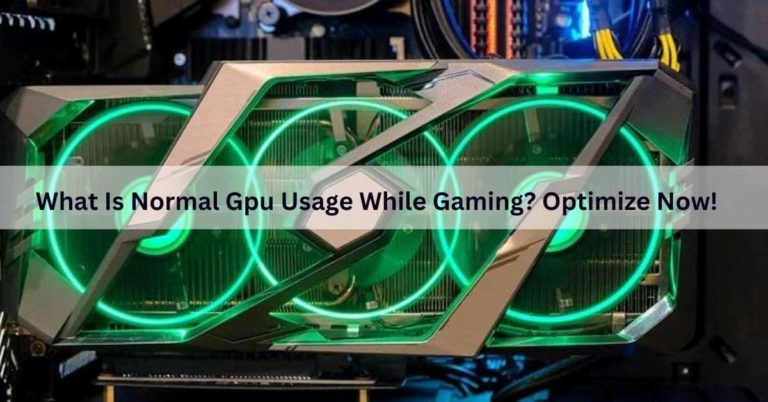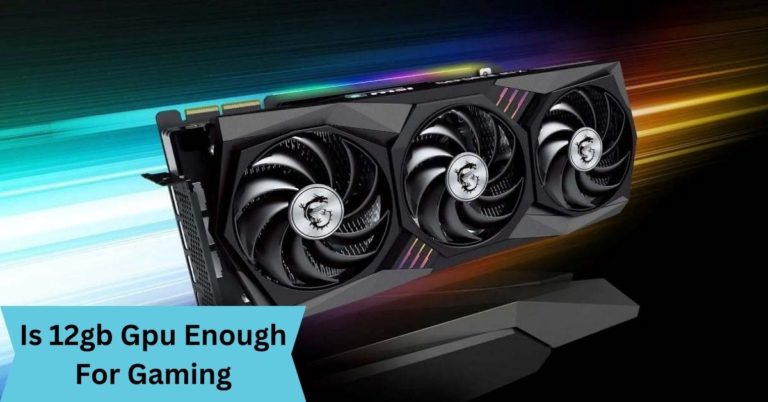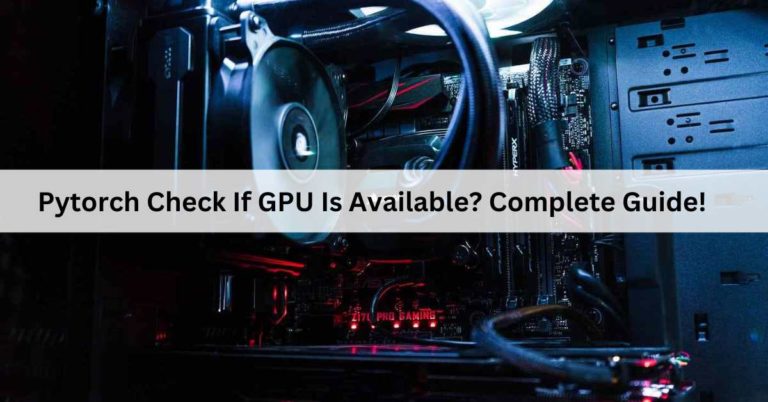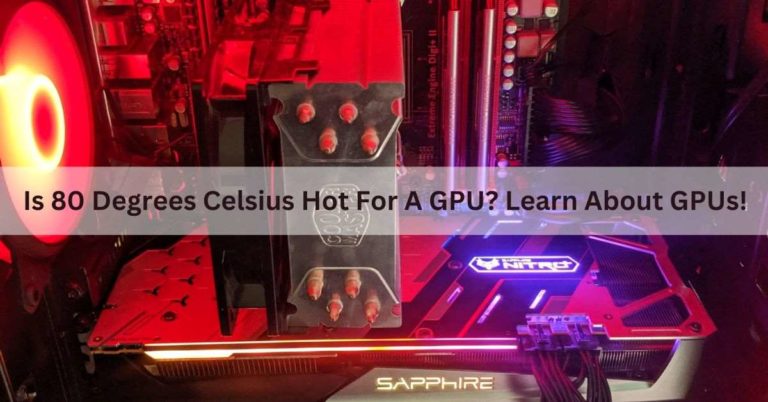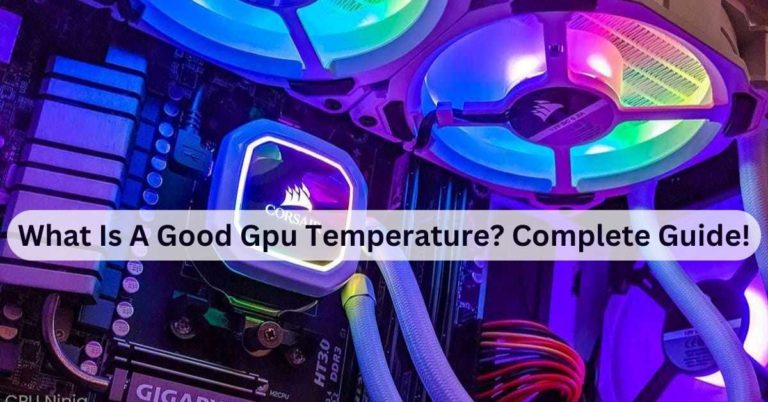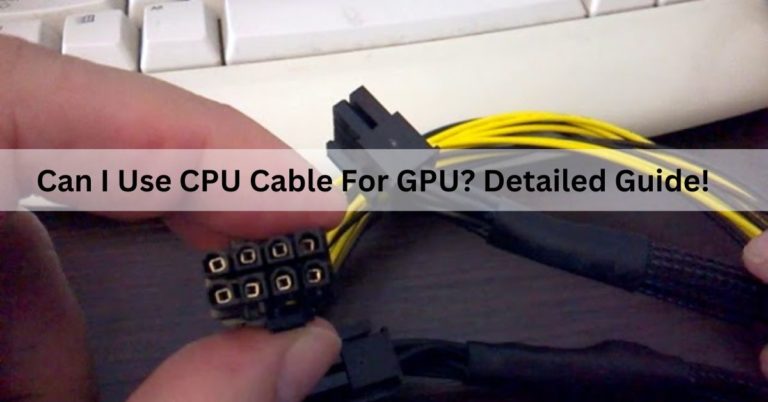What Should GPU Clock Speed Be? The Ultimate Guide!
As a passionate gamer, you’re no stranger to the importance of GPU clock speed in delivering that silky-smooth gaming experience.
The ideal GPU clock speed depends on your specific graphics card and usage. Gaming requires higher GPU clock speeds, but factors like cooling, budget, and monitor resolution also matter. A faster GPU clock speed improves video editing performance.
In this article, we will give you information about GPU clock speed. If you want information about it, then come with us.
Understanding GPU Clock Speed – Everything Here To Know!
GPU clock speed, also known as GPU core clock, tells us how fast the computer’s graphics processor (GPU) can do its job. It’s measured in megahertz (MHz) or gigahertz (GHz), like the speed of a car’s engine.
The faster the GPU’s clock speed, the quicker it can do tasks for making pictures and videos on your screen.
Your games and graphics look better and work smoother when it’s faster. A high GPU clock speed can also help reduce latency, improving performance in games and other graphics-intensive applications.
What does GPU overclocking mean?
GPU overclocking means increasing the clock speed of your graphics card beyond its default settings. This can enhance performance but requires caution to avoid overheating and instability.
Is it safe to overclock your GPU?
Overclocking your GPU can boost performance, but it carries risks. It may lead to overheating or instability. Ensure proper cooling, monitor temperatures, and proceed cautiously to balance performance gains with potential drawbacks.
Also read: Can I Use CPU Cable For GPU? Detailed Guide!
Factors Affecting GPU Clock Speed – Factors Are Here!

Many things can change how fast a GPU works, and it’s essential to think about them when picking a graphics card or making your current one work better. Here are some critical things to remember:
- GPU Model:
Different GPU models have varying base and boost clock speeds. Higher-end GPUs tend to have faster clock speeds, delivering better performance.
- Cooling Solutions:
Effective cooling solutions, like advanced fans or liquid cooling, can help maintain consistent clock speeds by preventing overheating.
- Overclocking:
Overclocking involves manually increasing the GPU clock speed to achieve higher performance. However, this can also lead to increased heat generation and potentially reduced GPU lifespan.
- Power Supply:
A robust and efficient power supply unit (PSU) ensures that your GPU receives a stable power flow, which can help maintain optimal clock speeds.
- System Temperature:
High temperatures can cause a GPU to throttle its clock speed to prevent overheating. Proper system cooling is vital to maintaining high clock speeds.
GPU Clock Speed and Gaming – Experience Are Here!
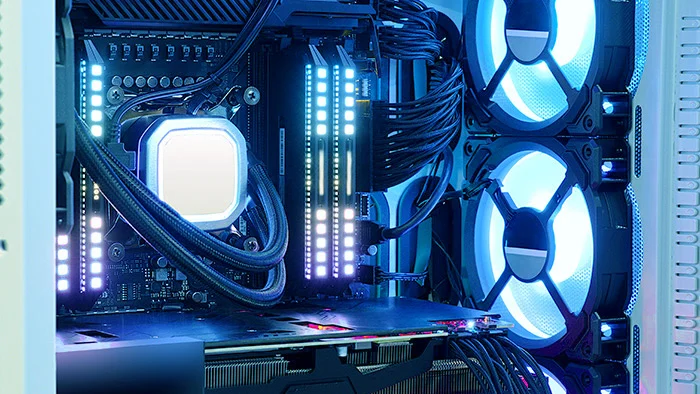
For people who play video games, how fast the GPU works is super important for how good the game feels. When you’re picking a GPU for gaming, think about these things:
- Gaming Resolution:
The GPU clock speed impacts performance at different resolutions. If you plan to game at higher resolutions like 1440p or 4K, a GPU with a higher clock speed will provide smoother gameplay.
- Game Requirements:
Some games are more demanding than others. Faster clock speeds are beneficial for running graphically intensive games with high settings.
- Frame Rates:
If you aim for high frame rates (e.g., 144Hz or 240Hz), a GPU with a faster clock speed is necessary to consistently maintain those high frame rates.
- Ray Tracing:
Ray tracing technology in modern games places an additional load on the GPU. A faster clock speed helps improve ray tracing performance.
- Overclocking:
Enthusiast gamers may overclock their GPUs to achieve higher clock speeds and, consequently, better gaming performance. However, this should be done cautiously, considering the potential risks.
Finding the Right Balance – Check It Out!
Even though having a fast GPU is usually good for gaming, you must find the right balance. You should think about the speed and things like keeping it cool, how much power it uses, and how much money you can spend. Here are some tips for finding that balance:
- Consider Your Monitor:
Your monitor’s refresh rate should match your GPU’s capabilities. For example, if you have a 60Hz monitor, you don’t necessarily need a GPU with a sky-high clock speed.
- Cooling:
Ensure your GPU has adequate cooling to maintain stable clock speeds. Overheating can lead to performance drops and potentially damage the GPU.
- Budget:
High-end GPUs with the fastest clock speeds can be expensive. Evaluate your budget and performance needs to find the best GPU for your requirements.
- Future-Proofing:
If you plan to keep your GPU for several years, consider investing in a model with a higher clock speed to ensure it can run newer games.
- Benchmarking:
Look for GPU benchmarks and reviews to see how different GPUs perform in the games you want to play. This can help you make an informed decision.
Working of GPU – Gain Your Knowledge!

In addition to gaming, GPUs are crucial for various professional applications, including video editing, 3D rendering, and scientific simulations. For these tasks, GPU clock speed is equally important. Here’s how it affects workstation and content creation tasks:
- Rendering Speed:
A GPU with a higher clock speed can significantly reduce rendering times in 3D modeling and rendering software.
- Video Editing:
When editing high-resolution videos, a faster GPU can improve the speed and responsiveness of the editing process.
- Parallel Processing:
Many content creation applications leverage GPU acceleration. A faster GPU can handle parallel processing tasks more efficiently.
- Professional Software:
Check the recommended system requirements for your professional software. Some applications may benefit more from a higher clock speed, while others may require ample VRAM or a specific GPU architecture.
- Stability:
Stability is crucial for professional work. Ensure your GPU runs at a stable clock speed to prevent crashes or errors during critical tasks.
Overclocking and Risks – Explore Risks!
Overclocking is a method used to push a GPU beyond its factory-set clock speeds to achieve higher performance.
It can be a valuable tool for gamers and enthusiasts looking to get more out of their GPUs. However, it comes with some risks:
- Heat Generation:
Overclocking increases the heat generated by the GPU. Inadequate cooling can lead to overheating and potential damage.
- Reduced Lifespan:
Overclocking can reduce the lifespan of your GPU. Finding a balance that offers a performance boost without causing long-term harm is essential.
- Warranty Concerns:
Overclocking may void your GPU’s warranty, so checking the manufacturer’s policies is essential.
- Stability:
Not all GPUs can be overclocked to the same extent. Some might handle overclocking better than others so results can vary.
Before overclocking, research your specific GPU model, use reliable software, and monitor temperatures and stability. Proceed cautiously, and be prepared for potential trade-offs between performance and longevity.
GPU Clock Speed Myths – Let’s Check Myths!

There are several myths and misconceptions surrounding GPU clock speeds. Let’s debunk a few of them:
- Higher Clock Speed Always Means Better Performance:
While higher clock speeds generally lead to better performance, other factors, such as the number of CUDA cores, memory speed, and VRAM, also play a crucial role.
- Overclocking Guarantees Better Performance:
Overclocking is not a guaranteed path to better performance. The extent to which a GPU can be overclocked depends on various factors, including its architecture and cooling.
- Max Clock Speed Is All That Matters:
GPUs have both base and boost clock speeds. The boost clock is the maximum speed a GPU can achieve under load, but it may only sometimes sustain that speed due to factors like temperature and power limits.
Is It Bad That My GPU And Mem Clock Are Max All The Time?
Running your GPU and memory clock at maximum all the time isn’t necessarily bad, but it can lead to higher power consumption and heat.
Ensure your cooling system can handle it, monitor temperatures, and consider adjusting settings based on your usage to balance performance with efficient operation.
How to Overclock Your Graphics Card (GPU)?
To overclock your GPU, use specialized software like MSI Afterburner. Incrementally increase core and memory clock speeds, testing for stability after each adjustment.
Monitor temperatures to prevent overheating. Find a balance between performance gains and system stability, and proceed with caution to avoid potential risks.
Does Boost Clock Matter?
Yes, the boost clock matters. It represents the maximum speed a graphics card can achieve under certain conditions. A higher boost clock generally leads to better performance, but other factors like cooling and system compatibility also influence overall GPU performance.
Does Memory Clock Speed Affect FPS?
Yes, memory clock speed can affect FPS (frames per second). Higher memory clock speeds can improve the transfer of data between the GPU and VRAM, potentially enhancing gaming performance and FPS. However, the impact may vary based on the specific game or application.
What’s The Difference Between Memory Clock and Core Clock on a GPU?
The core clock on a GPU determines the speed of the processor, influencing overall performance. The memory clock, on the other hand, regulates the speed at which data is transferred to and from the GPU’s memory, affecting tasks like texture loading. Both clocks contribute to the GPU’s overall capabilities.
Is Memory Clock Speed Important?
Yes, memory clock speed is important for a GPU. It affects the speed at which data is transferred to and from the graphics card’s memory (VRAM).
Higher memory clock speeds can improve performance in graphics-intensive tasks, such as gaming, by enhancing the data transfer rate and overall responsiveness.
What Is A Good GPU Clock Speed For Gaming?
A good GPU clock speed for gaming depends on the specific graphics card. Generally, look for GPUs with base and boost clock speeds that meet or exceed the recommended requirements of the games you intend to play. Higher clock speeds often result in better gaming performance.
GPU Memory Clock Speed vs GPU Core Clock Speed?
The GPU memory clock speed determines how quickly data moves to and from the graphics card’s memory.
The GPU core clock speed dictates the processor’s speed, influencing overall performance, including tasks like rendering graphics. Both are crucial for a GPU’s functionality, impacting different aspects of its performance.
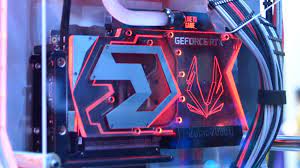
How Much Can GPU Overclocking Actually Improve My Performance?
GPU overclocking can improve performance, but the extent varies. Typically, it provides a noticeable boost in frames per second (FPS) for graphics-intensive tasks like gaming.
However, gains depend on factors like the specific GPU model, cooling efficiency, and how well the rest of your system supports overclocking.
Frequently Asked Questions:
1. What is GPU clock speed, and why is it important?
GPU clock speed, or GPU core clock, measures how fast a graphics card’s processor can perform tasks. It’s crucial because a higher clock speed usually leads to better graphics performance in gaming and other graphical applications.
2. Does a higher GPU clock speed always mean better performance?
While higher clock speeds generally result in better performance, other factors like the number of CUDA cores, cooling, and the specific GPU architecture also play a significant role. It’s essential to consider these factors in addition to clock speed.
3. How does GPU clock speed affect gaming performance?
A higher GPU clock speed benefits gaming, especially at higher resolutions and frame rates. It allows the GPU to process more data quickly, delivering smoother gameplay and better visual quality in graphically demanding games.
4. Can I overclock my GPU to achieve a higher clock speed?
Many GPUs can be overclocked to achieve higher clock speeds, potentially improving performance. However, overclocking should be done cautiously, as it can generate more heat and may void warranties. Proper cooling and monitoring are essential.
5. What should I consider when choosing the right GPU clock speed?
When selecting a GPU, consider your gaming resolution, budget, cooling system, and the types of games or applications you use. Finding the right balance between clock speed, stability, and cost.
6. Are there any risks associated with overclocking my GPU to increase its clock speed?
Overclocking can lead to increased heat generation, potentially reducing the GPU’s lifespan and voiding warranties. It also requires careful monitoring and may only sometimes result in stable performance gains. Proceed with caution and within the limits of your specific GPU model.
7. Does GPU clock speed matter for gaming?
Yes, GPU clock speed matters for gaming as it influences the speed at which the graphics processor performs calculations. Higher clock speeds generally result in better gaming performance and smoother graphics.
8. How high is too high regarding the GPU Core and Memory MHz?
The ideal GPU core and memory MHz depend on the specific graphics card and its architecture. However, excessively high clock speeds can lead to overheating and instability, compromising overall performance and longevity.
9. Does the GPU clock speed refer to the speed of the whole GPU or the speed of each core?
The GPU clock speed typically refers to the speed of the entire graphics processing unit (GPU) rather than the individual cores. It represents the frequency at which the GPU as a whole processes instructions.
10. Do the numbers written on GPUs by manufacturers have any specific meaning like “number of transistors” or “clock speed”?
Yes, the numbers on GPUs by manufacturers often represent specifications such as the number of transistors, clock speed, memory size, and other performance-related details. These specifications give users an idea of the GPU’s capabilities and features.
11. When you say a processor is 1.8 GHz with 4 cores, does that mean that each core is 1.8 GHz, or the processor as a whole?
When a processor is specified as 1.8 GHz with 4 cores, it means that each individual core operates at 1.8 GHz. In this context, the clock speed refers to the speed of each core, not the processor as a whole.
12. In graphic cards which matters more, the number of CUDA cores or the speed of the graphic card?
The importance of CUDA cores versus the speed of a graphics card depends on the specific workload. For parallel processing tasks, more CUDA cores can be beneficial.
However, for general gaming performance, the overall speed of the graphics card, including factors like clock speed and memory bandwidth, is crucial.
13. Why do most GPUs only have about half the boost clock speed of CPUs?
The boost clock speeds of GPUs and CPUs are influenced by their respective architectures, designs, and intended purposes. GPUs are optimized for parallel processing and graphics rendering, while CPUs are designed for a broader range of tasks.
FINAL WORDS:
GPU clock speed plays an important role in enhancing gaming and professional performance, yet it’s not the sole influencer. Factors like GPU model, cooling, and resolution also play a significant role. Overclocking offers potential gains but comes with risks, including heat generation and potential warranty voiding. Striking the right balance between clock speed, stability, and cost is paramount for an optimal computing experience.

